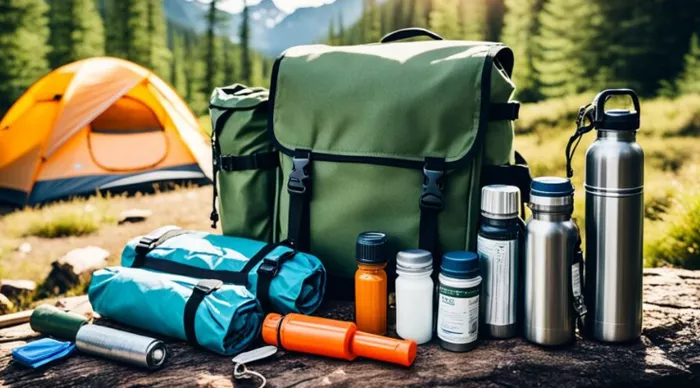A tent is your home away from home. It protects you from wind, rain, and bugs. A good tent should be waterproof, easy to set up, and roomy enough for everyone. If you’re hiking, choose a lightweight tent. For car camping, you can use a larger and more spacious one.
What to Look For:
- Waterproof material and strong zippers
- Ventilation panels to reduce condensation
- Easy setup features like color-coded poles
1.Sleeping Bag and Pad for Restful Nights
Sleeping outdoors doesn’t have to mean discomfort. A good sleeping bag keeps you warm at night. A sleeping pad gives you a soft place to lie on and insulates you from the cold ground. Choose based on weather and how much weight you can carry.
Sleeping Bag Tips:
- Pick a bag rated for temperatures lower than what you expect
- Down is warmer and lighter, but synthetic stays warm even when wet
Sleeping Pad Tips:
- Self-inflating pads balance comfort and packability
- Foam pads are cheap, light, and durable
2. Portable Cooking Gear
Hot meals make camping more enjoyable. A portable stove or grill helps you cook easily at your campsite. Don’t forget a lighter or waterproof matches. Also bring a pot, a pan, a mug, and utensils.
Essentials for Camp Cooking:
- Compact stove with fuel canister
- Lightweight cookware set
- Spork or spoon/fork combo
- Biodegradable soap and sponge for clean-up
3. Light Source for Night Safety
Light is a must for moving around camp at night. Headlamps are best because they keep your hands free. Lanterns light up the whole area, and flashlights are great backups. Always carry extra batteries or a solar charger.
Lighting Tips:
- Headlamps with adjustable brightness are ideal
- Use LED lights to save power
- Solar lanterns work well and don’t need batteries
4.First Aid Kit and Safety Tools
Safety should always come first. A first aid kit is vital for treating cuts, bites, and burns. Include bandages, pain relievers, antiseptic wipes, tweezers, and any personal medications. Safety tools like a multi-tool, map, compass, and whistle also help in emergencies.
Pack These in Your First Aid Kit:
- Adhesive bandages and medical tape
- Antiseptic wipes and antibiotic cream
- Gauze pads, tweezers, and scissors
- Snake bite kit (if in snake areas)
Other Helpful Extras
Though not top five, these items are still helpful:
- Camping chairs for comfort
- Coolers for keeping food fresh
- Trash bags for waste
- Insect repellent and sunscreen
Conclusion
Camping is a great way to enjoy nature. With the right gear, you can stay safe, sleep well, and enjoy tasty meals. Start with these five necessities: a reliable tent, a sleeping system, cooking gear, lighting, and safety tools. Then add extras that make your trip even better. Plan well, pack smart, and enjoy your adventure!
Related topics:
- Best Motorcycle Camping Gear: A Comprehensive Guide
- Best Lightweight Pop-Up Tent: A Detailed Guide
- What to Pack for a One-Night Camping Trip?

